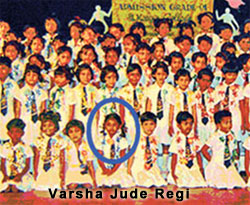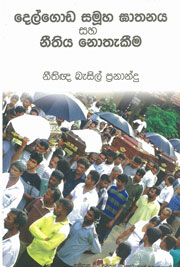A comparison of the abduction of Varsha Jude Regi and the Delgoda family massacre
 The abduction and the killing of six-year-old Varsha in Trincomalee, followed by the deaths in custody of two of the alleged abductors brings to mind many similar instances, particularly the case of the family massacre at Delgoda where on the 26th May, 2007 five members of the family were brutally massacred inside their own home. Both these incidents, one in Trincomalee and the other in Delgoda, sent shockwaves throughout the country. In both instances the alleged perpetrators were arrested within a short time and thereafter reports were published that they had been killed while in police custody.
The abduction and the killing of six-year-old Varsha in Trincomalee, followed by the deaths in custody of two of the alleged abductors brings to mind many similar instances, particularly the case of the family massacre at Delgoda where on the 26th May, 2007 five members of the family were brutally massacred inside their own home. Both these incidents, one in Trincomalee and the other in Delgoda, sent shockwaves throughout the country. In both instances the alleged perpetrators were arrested within a short time and thereafter reports were published that they had been killed while in police custody.
Regarding the Delgoda massacre there were many complaints that the actual reasons for this massacre and the actual persons who were responsible for it, have never been brought to light. The family members of the two arrested persons provided details stating that the killing of the two persons had not happened in the manner described by the police. The police version was that they were trying to attack the police at a certain place, while in police custody and as a result were shot dead. The families maintain that in fact, one of them had been killed inside the police station and thereafter brought to another place where the bodies were dumped. There have been no investigations into such allegations.
What is not being investigated in all similar instances in Sri Lanka is the police responsibility to have prevented the tragedy as well as their responsibilities to properly investigate and bring the matter before the court as would be done in any country which has a rule of law system.
What did the police do from the time of receiving a complaint about the abduction of Varsha on Wednesday the 11th March to Friday the 13th when her body was found in a bag in a drainage ditch. The police were fully aware that a ransom demand had been made. The police would have had sufficient linkage and information sources to be able to know what was going on and to intervene effectively in order to prevent this death. There had been earlier instances some years ago when conscientious police officers had handled such abductions and demands for ransom with competence and so was able to avoid harm to the victim. As the whole episode relating to Varshas abduction and killing happened within a very limited area of a small town like Trincomalee there would have been opportunities that could have been exploited by the police to develop an intelligent plan to ensure the rescue of the child before anything else.
In the Delagoda massacre also there were allegations that there had been threats to the family for a long time which was known to the police. Had the police taken adequate precautions as required of a law enforcement agency that is responsible for the security of persons, that massacre too, could have been avoided. Much the same can be said of many similar tragedies that take place all the time.
Not only did the police fail in prevention but in both of these instances the alleged perpetrators were also allowed to be killed while being under arrest. The obligation of any law enforcement agency who secures the arrest of a suspect is to ensure maximum security for him so that justice can take place according to the law. Such protection is not a favour done to those people. It is an obligation owed to society. Society must know how the crime took place and the factors that contributed to it so that society can develop its consciousness and the strategies in order to strengthen the protective network of the society. When society is deprived of the details of the crime it is denied vital information that is required for it to protect itself.
Criminal negligence of the police
A law enforcement agency that claims that the suspects under arrest can come to be in a position to attack the police or that they can commit suicide by taking cyanide while in police custody are themselves liable for criminal negligence. The police officers who cannot protect arrested persons do not deserve to hold the title of law enforcement officers. In fact, their failure itself should have been investigated and all the officers, particularly the senior officers who allowed such deaths to take place in police custody should have been themselves prosecuted.
It is not possible to develop an effective strategy to eliminate or control crime without developing at the same time an effective machinery to investigate the police failures to uphold the rule of law. If the police themselves are allowed to deal with criminal elements in a gangster-like fashion that is an indication of a society that is suffering from an acute societal crisis. The essence of such a crisis is a social acceptance that proper law enforcement, according to the norms and standards of the rule of law is no longer possible.
Custodial deaths allowed to make people happy
In the instances of Varshas abduction and assassination as well as the Delgoda family massacre allowing the suspects to be killed in police custody has been justified on the basis that such actions make people happy. Thus, it has become a habit in policing to allow suspects to be killed in custody in order to make people happy. If people feel happy to hear such news about alleged suspects being killed in custody it is merely an indication of a collective depression of mind that society is suffering from.
Over and over again the question of the monstrosity that the Sri Lankan police have become is being raised by almost every incident of serious crime. The incapacity and unwillingness to investigate crimes and the substitution of extrajudicial killings in place of investigations has become the norm.
It is only a civil society movement committed to the rule of law, the right to life and the defence of freedom of expression that can offer a positive alternative to this societal degeneration.
For the earlier statement on Varshas abduction kindly see: SRI LANKA: East Has Become Bihar-like at: http://www.ahrchk.net/statements/mainfile.php/2009statements/1953/
Please see also, Sri Lanka: The Delgoda Family Massacre and Confronting Lawlessness at:
http://www.ahrchk.net/pub/mainfile.php/delgoda/
